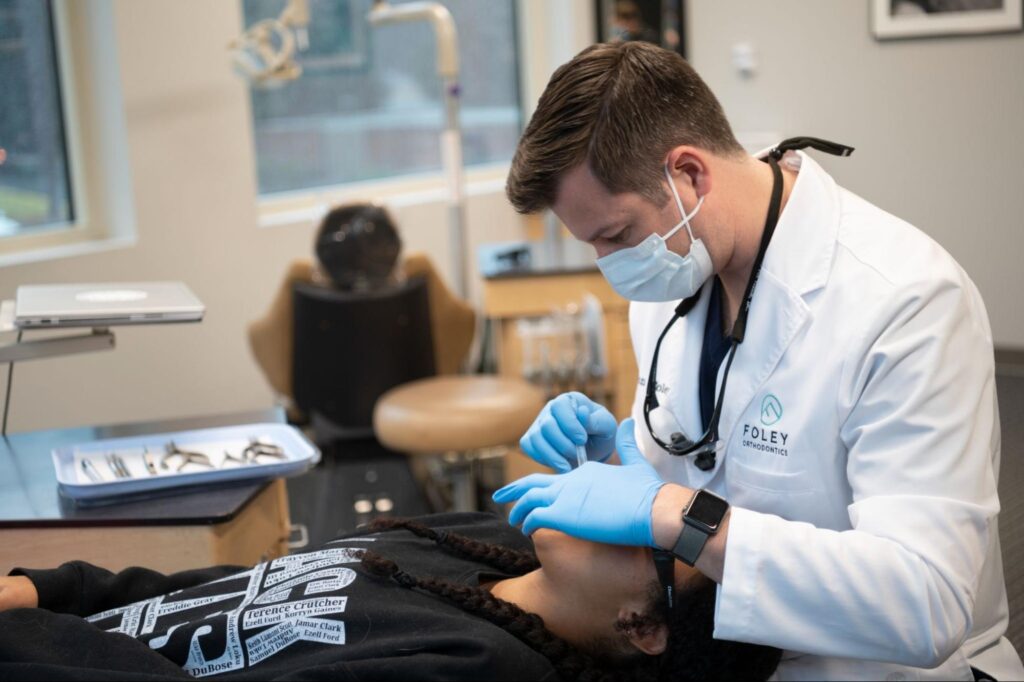Braces are a memorable experience for each patient, as many factors influence individual treatment. However, most patients will encounter several situations during their orthodontic treatment. The Foley Orthodontics team will discuss some of the most common braces concerns, like tightening, wire pokes, ulcers, and other concerns you may have.
Ulcers, Tightening & Wire Pokes
Of all the issues our patients encounter with their braces, we’ve found that these three appear often in appointments with Dr. Foley:
1. Mouth Ulcers
- Description: The friction caused by traditional braces can lead to mouth ulcers or canker sores on the soft tissues of the mouth.
- Management Tips: To soothe irritation, use over-the-counter remedies or a saltwater rinse. Maintaining good oral hygiene and steering clear of spicy or acidic foods can help prevent further discomfort. If the sores persist or worsen, schedule a visit for a professional evaluation.
2. Discomfort After Tightening
- Description: You may experience pressure or soreness after adjustments as the braces apply force to shift your teeth into place.
- Management Tips: Taking over-the-counter pain relievers like ibuprofen or acetaminophen can provide relief. Eating soft foods during this period can also help alleviate discomfort.
3. Irritating Wire Ends
- Description: Occasionally, the ends of the wires may poke at the inside of your mouth, leading to irritation.
- Management Tips: To reduce discomfort, apply orthodontic wax to the offending wire ends. You can also gently reposition the wire using a cotton swab. If the irritation continues, don’t hesitate to contact our office for assistance.
Unpacking Common Concerns
All of the concerns our patients have about their braces are completely understandable, and Dr. Foley is passionate about hearing what you and our other patients have to say. We’ve compiled an easy-to-understand overview of tips and tricks to keep your treatment on track from day one:
1. Oral Hygiene Challenges
- Cleaning Around Braces: Brushing and flossing can be quite tough with braces, as food particles can easily get trapped in brackets and wires.
- Importance of Hygiene: Maintaining good oral hygiene is fundamental to preventing plaque buildup, cavities, and gum disease. You can use specialized cleaning tools to clean your appliance.
2. Food Restrictions
- Diet Tips: To minimize eating issues, it’s usually smart to stick to softer foods or cut up harder foods into smaller pieces.
- Certain Foods: We strongly advise our patients to avoid tough, sticky, or chewy foods that can damage braces or get stuck in the components.
3. Adjustments and Appointments
- Regular Visits: It’s key to attend all appointments with Dr. Foley for adjustments and monitoring progress. Much like school classes, they shouldn’t be skipped!
4. Aesthetic Concerns
- Appearance of Braces: A good number of patients worry about how braces will affect their smile and overall appearance, which is part of why we offer various options for orthodontic treatment.
- Options Available: Clear braces or Invisalign are alternatives that can offer a more discreet option for patients who are worried about aesthetics.
5. Impact on Speech
- Temporary Lisp: Patients may observe some changes in their speech, like a slight lisp, especially shortly after getting braces. We’re happy to report that this usually improves over time as patients adjust to having their braces remain in place.
6. Elastics and Additional Appliances
- Use of Elastics: Certain patients may need to wear elastics in addition to their braces to correct bite issues. With elastics, compliance is key, and failure to do so can prolong the overall treatment duration or introduce new issues.
7. Changes in Bite
- Bite Adjustments: As their teeth start to shift, patients can notice changes in their bite, which can be strange and unfamiliar at first. Regular check-ups with us allow Dr. Foley to monitor and adjust treatment as necessary.
8. Emergency Situations
- Broken Brackets or Wires: Patients may encounter situations where brackets detach, or wires jab their gums, causing discomfort.
- What to Do: It’s important to contact our office for advice on handling these emergencies—and to seek emergency medical care for the worst of them.
9. Duration of Treatment
- Length of Treatment: Patients often worry from day one about how long they require treatment. Treatment duration varies greatly and is based on individual cases, spanning months to years. We’ll give you a thorough breakdown of your plan in the beginning. Compliance helps keep this plan on track.
Leaving Worries Behind
We know that getting braces can come with its challenges, particularly for those experiencing it for the first time. However, you can feel confident knowing you’re not alone on this journey! We hope this blog has provided insight into the various solutions available for any difficulties you may encounter. Our team frequently addresses these situations, and we take pride in serving the Cary community, where we’ve been fortunate to receive so much support!
 Free Consult
Free Consult


